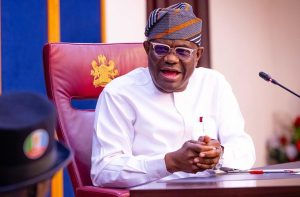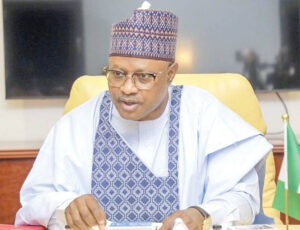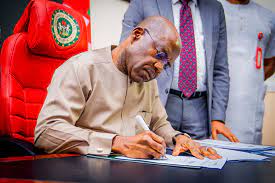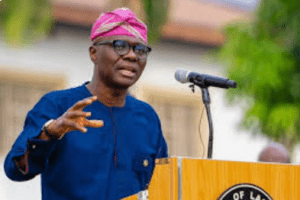Against the backdrop of the call for accountability on the part of state executives for loans they collected onbehalf of the people, Juliet Jacob writes this special feature
In the Beginning
Since the advent of the new Republic in the new democratic dispensation (199-Date), Nigeria’s governors in the 36 states that make up the federation and the ministers of the Federal Capital Territory (FCT) have been borrowing from the international or foreign organizations to fund development projects in their respective states. The loans now run into trillions of the United States Dollars. Many of the purported development projects have remained white elephants. And the critical civil society organisations have been kicking, demanding audit of the loans.

Recently, SERAP petitioned the federal government, accusing the state governors of impoverishing their states by their lavish spending and lifestyle. SERAP went as far as filling a lawsuit at the Federal High Court, Abuja, seeks to compel the governors and Minister of FCT, Nyesome Wike to account for a staggering sum of N5.9 trillion and $4.6 billion in loans.
The Illusion of Progress
In the Nigeria’s political landscape, blame and accountability seem to be a permanent feature.
A close observation reveals a stark reality of deliberate underdevelopment perpetuated by state governors. Uba Sani, Kaduna State Governor, said recently, “Fuel subsidy removal is reflected in our state allocations, and we now have a surplus of money.”

Amidst the rhetoric of progress and development, the true beneficiaries of governance remain elusive, leaving a trail of widespread poverty and disillusionment in its wake.
The Culture of Exploitation
“Nigerian governors exploit their own state. They grab lands, float companies, and engage in all sorts of unpatriotic endeavours,”declares a keen observer of this development.
Such revelations underscore the systemic failure that plagues Nigeria’s governance structure. Funds meant for development are siphoned off, leaving local communities bereft of progress.
Entitlement and Exorbitant Privileges
“The Governors and Deputy Governors Pension Law 2014: “The law in Akwa Ibom, which was first passed in 1998, provides free medical treatment for ex-governors, their spouses, ex-deputy governors and their spouses.”
Such exorbitant privileges bestowed upon former governors highlight the entrenched culture of entitlement, further exacerbating the economic woes of the populace.
Demand for Transparency and Accountability
In the face of mounting evidence, it becomes imperative for Nigerians to demand greater transparency and accountability from their state governors. Only through sustained scrutiny and pressure can the cycle of underdevelopment be broken, paving the way for a brighter future for all Nigerians.
Lavish Spending: A Deep Dive into State Governments’ Extravagance
A Closer Look
Let’s delve into the figures and states involved:
Abia State: Reportedly spent N397,520,734.84 on ‘feeding and welfare’ and N223,389,889.84 on ‘refreshments and meals.’

Akwa Ibom State: Allegedly disbursed N92.54bn on allowances, travel, utilities, and materials within just two quarters.
Adamawa State: Reportedly allocated N40.90bn for non-salary expenditure, including furniture allowance and travel expenses.
Anambra State: Allegedly spent N15.17bn on frivolous items by the end of quarter two, 2023.
Bauchi State: Reportedly splurged N70.25bn on travel, welfare, and various expenses, including ‘praise night/thanksgiving expenses’ and ‘marriage ceremony support.’
– Lagos State: Awarded N440,750,000 for the procurement of a bullet-proof Lexus LX 600 and budgeted N2bn for rechargeable fans and lights.

Benue State: Reportedly spent N34.44bn on ‘special day celebrations,’ welfare packages, and security votes.
Other States: Borno, Cross Rivers, Delta, Ebonyi, Ekiti, Enugu, Gombe, Imo, Jigawa, Kaduna, Kano, Katsina, Kebbi, Kwara, and Kogi also allegedly engaged in frivolous spending, with figures ranging from N17.79bn to N152.15bn.

Legal and International Obligations
The Fiscal Responsibility Act clearly stipulates guidelines for government borrowing and expenditure. However, reports indicate widespread disregard for these regulations.
Additionally, international bodies like the World Bank are urged to ensure compliance with anti-corruption laws and human rights standards.
The Call for Accountability
With public outcry mounting, there’s a pressing need for transparency and accountability in Nigeria’s governance. Citizens demand an end to the culture of opulence at the expense of essential services. As the spotlight intensifies, state governments face increasing scrutiny to justify their spending and uphold their obligations to the people.
The Nigerian Quagmire
Evident across the Nigerian landscape are the grim manifestations of this systemic exploitation. The states, once heralded as bastions of promise, now languish under the weight of profound socio-economic malaise:
Unemployment, Income Disparity, Insecurity, Poverty, Lack of Basic Services
Central to this narrative are the twin pillars of power politics and economic exploitation, wielded with ruthless efficiency by state governors.
A Call to Action
Amidst the gloom, a glimmer of hope emerges—a clarion call for accountability and reform:
Empowerment, Transparency, Citizen Action
In confronting the stark realities of Nigeria’s governance landscape, the echoes of history reverberate with chilling clarity. As the nation stands at the crossroads of its destiny, the imperative for change has never been more urgent. Only through collective resolve and unwavering commitment can Nigeria break free from the shackles of exploitation and pave the path to a brighter tomorrow.
Power Politics Reign Supreme
In a kingdom where power is paramount, Nigerian governors wield their authority with a strategic grip. They meticulously install loyalists at every government level, ensuring accountability solely to themselves. This political maneuvering extends to local government appointments, tightly tethering chairmen to their whims. Upon exiting office, they anoint a successor, perpetuating their rule. Money, a tool readily available due to amassed wealth, fuels their dominance.
Economic exploitation is rife as governors demand a share of every major project, stalling progress unless their demands are met. Even foreign-sponsored endeavors are not spared, as evidenced by a foreign investor’s frustrating encounter with a state governor. Land grabs, company ownership, and self-serving ventures further enrich governors, perpetuating a cycle of greed and stagnation.
The Lawsuit
SERAP’s lawsuit, filed at the Federal High Court, Abuja, seeks to compel the governors and Mr. Wike to account for a staggering sum of N5.9 trillion and $4.6 billion in loans obtained by their states and the FCT. The organization demands the publication of loan agreements and details on project execution locations.
Transparency and Accountability
SERAP argues that opacity in loan spending continues to negatively impact citizens, with reports of mismanagement and lavish spending by state officials. Many states allegedly owe salaries and pensions, while public funds are diverted for luxury and unnecessary expenses.
World Bank’s Involvement
The World Bank, a significant lender to Nigeria, faces pressure to ensure loans are not misappropriated. SERAP calls for an investigation into loan spending and urges the suspension of further loans until transparency is ensured.
Calls for Action
With Nigeria’s total public debt at alarming levels, SERAP demands concrete action to address mismanagement. The organization calls for independent monitors to oversee loan spending and emphasizes the need for governors’ commitment to fiscal responsibility.
Unequal Distribution: Did All States Benefit?
In the corridors of power, Nigerian governors reign supreme, wielding political influence and economic prowess. Yet, amidst the opulence lies a tale of exploitation, controversy, and unequal distribution. As citizens demand accountability and transparency, the true legacy of these governors hangs in the balance, shaping the nation’s future.


